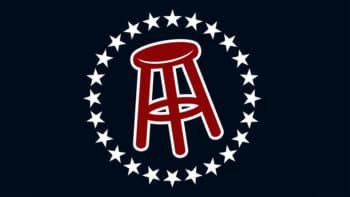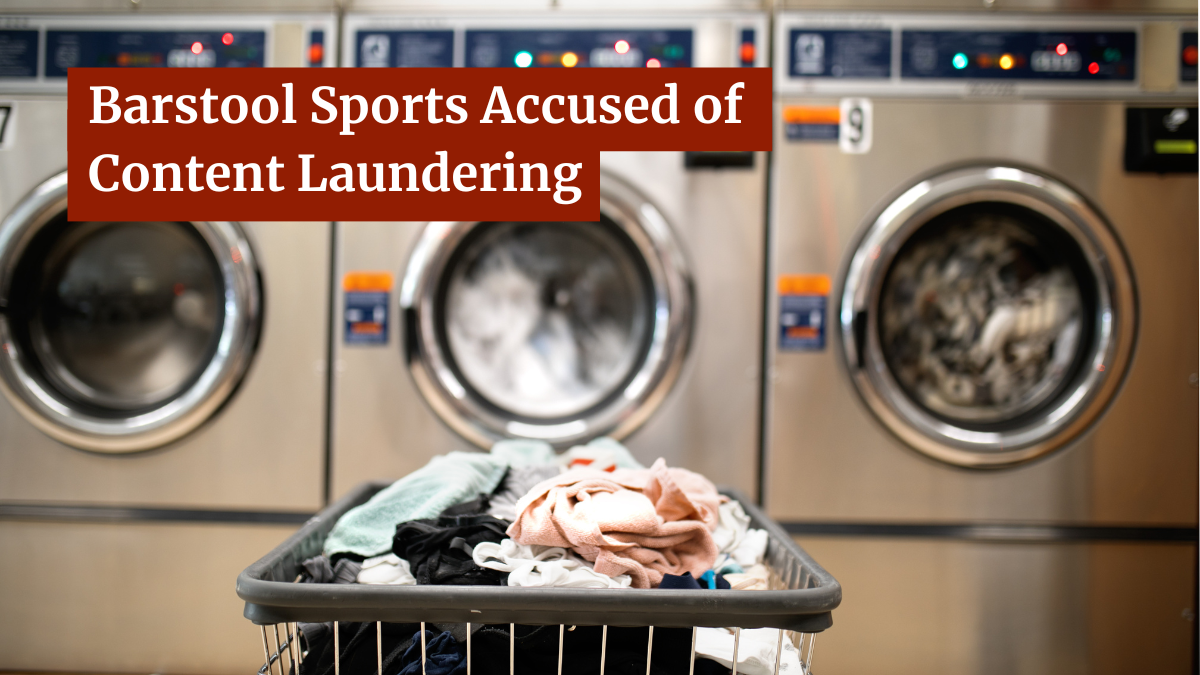Barstool Sports Accused of Content Laundering

Yesterday, Robert Silverman at The Daily Beast published a report that alleges Barstool Sports, the popular collection of sports news and infotainment websites, has been using “burner” Twitter accounts to post and share unlawful content while avoiding copyright repercussions.
The allegations are fairly straightforward. According to the report, Barstool Sports operates a network of at least 40 separate “burner” X (Twitter) accounts.
These accounts, though often with names similar to the main Barstool Sports accounts, are not tied directly to them and are only used to publish content that may create copyright issues. This includes highlights from sporting events, clips that contain copyright-protected music and other material that may be at risk of drawing unwanted attention from copyright holders.
The benefit of that is simple: When and if copyright notices are filed against the clips, they won’t target Barstool Sports’ main accounts, instead, it will target the burners. If those accounts are suspended or closed as the result of multiple notices, the main accounts, which have millions of followers, will not be impacted.
Instead, the company can just create new burner accounts and continue publishing just as before.
The evidence that this is what Barstool is doing is very strong.
According to the report, it’s been discovered that some of the accounts were registered using a Barstoolsports.com email address, others share names similar with Barstool properties and others user the word “burner” or a close variation in their name.
However, the most damming evidence may be the posts themselves. The posts don’t include any text and are generally reshared by the main Barstool accounts within a short period of time, often times just seconds. This means that there was no likely way Barstool Sports could search for and find the videos unless they also uploaded them.
This isn’t the company’s first run-in with copyright issues. In 2015, they were hit (along with several others) with DMCA notices filed by the NFL that resulted in their account being suspended. In 2016, the account was suspended again for sharing clips from the Summer Olympics.
It’s also not the first time the company has been caught using burners. In 2019, the company was accused of harassing comedian Miel Bredouw after one of the company’s burners stole a video from her. In the fallout from that, the company promised to improve their processes and they deleted over 60,000 old social media posts.
However, this latest report highlights just how little things have changed and how massive and deliberate this effort is, involving at least 40 separate burner accounts, with each account focusing on a specific topic that is within the Barstool Sports umbrella.
As such, it’s worth examining why Barstool Sports would adopt this approach, how it works and what, if anything, that can be done about it.
Why This Approach Works
The reason to take this approach is pretty simple: It protects the main Barstool accounts from potential suspension or deletion.
Simply put, many of the clips and photos that Barstool share would be considered risky from a copyright standpoint. They are highlights from sporting events, viral videos found elsewhere online and, in general, content not created by Barstool and not licensed to them in any way.
Sporting organizations, such as the NFL and MLB, have been very aggressive about protecting their copyright and that has included sending thousands upon thousands of takedown notices. To make matters worse for Barstool Sports, under the DMCA, hosts like Twitter are obligated to suspend the accounts of “repeat infringers” and have a policy for doing so on hand.
What this does is make it so that the original accounts are not the ones the takedowns count against. Instead, it’s these burner accounts that are suspended, only to be replaced by new ones as needed.
For Barstool, it’s the best of both worlds. They get to share the clips that they want to their millions of followers, without worrying that those lucrative accounts will be shut down. In short, the burner accounts sacrifice themselves to avoid their main accounts bearing the brunt of their own actions.
It’s a remarkably simple system, but not one without risks.
What Can be Done About It
On the surface, it seems like the perfect plan. Barstool Sports gets to post all the unlicensed content they want, and these burner accounts take all the punishment. However, there’s nothing stopping any of the sports agencies, viral video creators or others who were infringed from filing a lawsuit against them.
The evidence makes it pretty clear that these are accounts owned and operated by Barstool Sports and/or its employees as part of their job. Though there are a myriad of ways they could have better hidden the practice, they didn’t. The evidence of wrongdoing is overwhelming.
When hit with such a lawsuit, Barstool Sports could argue that some of the clips are a fair use. However, that’s going to be a challenging argument to make when they acted in bad faith and attempted (poorly) to hide who uploaded the videos. Courts typically frown upon such bad faith acts.
That said, it’s unlikely that such a lawsuit is forthcoming. For the major sports leagues, this is not a top of the agenda issue. They are battling more traditional piracy and more direct threats than unlawful clip sharing on X (Twitter). Those hurt the most by it, the individuals whose videos are lifted by Barstool Sports, are likely unable to bear the cost of such litigation.
Though the new Copyright Claims Board (CCB) may be a useful tool for bringing such cases, it’s unclear how the CCB would handle such a complicated case or if Barstool Sports would simply opt out. As of this writing, Barstool Sports is not listed as either a claimant or a respondent in any cases filed with the CCB.
What may be necessary is a shift in how we think about copyright responsibility in these situations. One where a company like Barstool Sports can’t simply hide behind burner accounts to escape liability.
A Quick Word on the Server Test
One issue that is tangentially related is the server test. Established in 2004, it involved a pornography company, Perfect 10, filing a lawsuit against Google alleging that Google Image Search was infringing their images by hotlinking and displaying pirated copies of them in results.
The Ninth Circuit Court of Appeals ruled in favor of Google, ruling that, since the images weren’t hosted on Google’s server, they were not responsible for the infringement.
That decision is now under fire. In more recent years, courts have begun to rule against the server test and, despite a recent win for it in the Ninth Circuit, there’s a very real debate and split over the issue.
However, the test doesn’t really enter into this particular conversation. First, both the original and reshared versions of the clips are on the same site, namely X (Twitter). Second, it’s the same entity that is uploading the original post and then sharing it, namely Barstool Sports.
In short, there’s one server and one entity.
What this does play more into is the DMCA. Right now, the DMCA has no penalties for accounts that reshare infringing material, even if they do so regularly and intentionally. The penalties all fall upon the account that originally uploaded the infringing material, even if that account is a burner one.
Though companies that wish to maintain an environment that discourages infringement can seek out and terminate such sharing accounts if they choose, there’s nothing in the law that forces them or even asks them to do so.
Considering that X (Twitter) is already facing a significant lawsuit for ignoring their existing DMCA obligations, it seems unlikely that the site will be reaching above and beyond any time soon.
Bottom Line
The most frustrating part of this story is not that Barstool Sports is laundering content with burner accounts, but that they are doing is so flagrantly, after they had promised to stop, and that, obviously, it is extremely effective.
There’s nothing in the law that really changes that. It falls upon rightsholders, like the NFL, to file a lawsuit against the site and, in doing so, both prove that it was them who uploaded the unlicensed material and that the content was not a fair use.
They certainly could, but for reasons discussed above, it’s also unlikely. The people most hurt by Barstool Sports’ behavior are also those least able to fight back.
The biggest positive right now is that this kind of behavior is, in general, rare. At least when it comes to large-scale mainstream sites. Though pirate sites have used similar tactics for years, this is still an oddity in a site that most people would consider a legitimate company.
However, the success of the approach may cause it to spread, especially among sites that routinely engage in risky behavior when it comes to copyright.
After all, if the system works from a legal standpoint, the only thing one has to ignore is the ethics. That seems to be exactly what Barstool Sports is doing, we’ll have to see if others follow.
Want to Reuse or Republish this Content?
If you want to feature this article in your site, classroom or elsewhere, just let us know! We usually grant permission within 24 hours.
